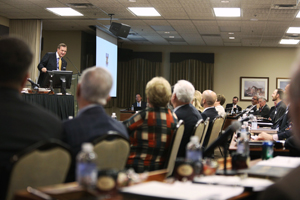The Southern Baptist Theological Seminary (SBTS) trustees unanimously approved a recommendation to adopt The Nashville Statement as an official part of the school’s confessional documents Oct. 9 during its fall meeting.
|
SBTS photo R. Albert Mohler Jr., president of The Southern Baptist Theological Seminary, speaks during the seminary’s trustee meeting on Oct. 9. |
The seminary’s board of trustees also responded to additional motions, heard financial reports, and celebrated record student enrollment from the previous academic year. The recommendation about The Nashville Statement came from seminary President R. Albert Mohler Jr.
The Nashville Statement is a document that affirms biblical teaching about gender and sexuality and seeks to clarify Christian beliefs on some of the most pressing cultural issues. It was published earlier this year by the Council on Biblical Manhood and Womanhood and signed by evangelical leaders across the United States, including each Southern Baptist seminary president. That SBTS adopted it, according to Mohler, is a matter of responsibility. See related report.
“Southern Seminary takes its confessional responsibility with great significance,” Mohler said in an interview immediately following the Board’s public session Monday evening. “Years ago, our Board of Trustees recognized the need of adopting certain statements that clarify and establish the meaning our longstanding confessional documents: the Abstract of Principles, adopted in 1859, and the Baptist Faith and Message, as revised in 2000.”
Like the “Chicago Statement on Biblical Inerrancy” and the “Danvers Statement on Biblical Manhood and Womanhood” – both previously adopted by the board – The Nashville Statement is a “timely addition” to that list of official documents, Mohler noted.
Faculty members at SBTS and Boyce College agree to sign and teach according to the Abstract of Principles and the revision of the Baptist Faith and Message. The Nashville Statement was adopted to help interpret those two binding statements and specify the seminary’s conviction on matters not directly addressed in the central confessions of the institution, Mohler said.
The Nashville Statement does not reflect new thinking, Mohler emphasized. Instead, he said, it affirms historic Christian teaching about human sexuality.
“The Nashville Statement is not a statement of new beliefs held by evangelicals,” Mohler said, “but is rather a distillation and clarification of what Christians have believed about these questions throughout 20 centuries – 2,000 years of church history. Ultimately, it is a statement of what we believe is revealed in Holy Scripture, and thus beliefs to which we are fully accountable and of which we are not ashamed.”
What is new, Mohler said, is the need to apply historic Christian teaching to contemporary confusion regarding sex and gender.
“These days, no Christian, and certainly no Christian institution or ministry, can avoid answering the most pressing questions presented to us by the culture,” he said. “These are real-life questions that will determine the policies and the substance of any ministry or school. The Nashville Statement is the kind of clarification that is so clearly needed at this moment.”
He noted, “One of the most important reasons for the very development of The Nashville Statement was to provide a clear statement of evangelical conviction about what we believe the Bible reveals and the Christian church has historically believed on matters of gender, sex and sexuality.”
Mohler said he hopes other evangelical institutions will follow the Board’s actions.
“In the end, I think the Nashville Statement will prove to be a watershed in the evangelical movement,” he said. “I would certainly hope that other evangelical schools, ministries and organizations will adopt the very same statement, and do so making very clear where they stand on this issue. Southern Seminary is making its convictions on these questions very clear, and I was glad to join with other evangelical leaders in adopting The Nashville Statement.”
In other business trustees:
- Observed a record enrollment at SBTS and Boyce College for the 2017-2018 academic year, with the number of students between the two schools climbing to 5,489.
- Heard reports from various sub-committees of the Board about the financial and student body health of the school. Without exception, reports told favorable stories about the state of SBTS.
- Adopted an expansion of SBTS’s doctrinal statement, which makes clear that the board is SBTS’s “final interpretive authority on the Bible’s meaning and application.” According to Mohler, the statement makes clear that the Board of Trustees is responsible for the theological guardianship of the seminary, since it is elected to do so by the Southern Baptist Convention. This recommendation also came from Mohler.
- Responded to a motion from the Southern Baptist Convention (SBC), June 13-14, in Phoenix, Ariz., that all SBC entities publish online the names and contact information for the trustees of each institution. The SBTS trustees replied that the school does not release personal data concerning its board, which is consistent with its policies regarding the security of personal information.
The next meeting of the Board of Trustees will take place April 16-17, 2018, in Louisville.
(EDITOR’S NOTE – The Southern Baptist Theological Seminary communications department released this report.)

